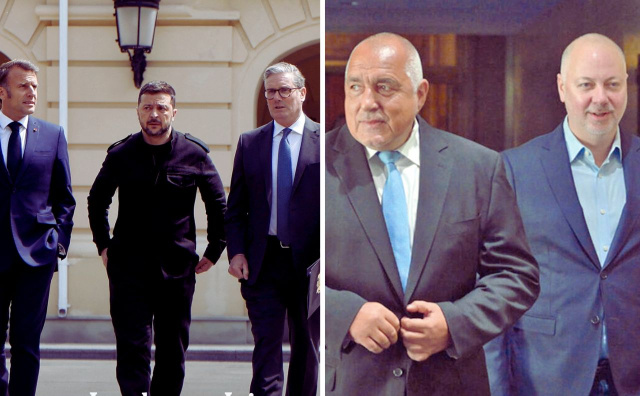
Borissov and Zhelyazkov (right); Macron, Zelensky, Starmer (left)
Bulgarian Prime Minister Rosen Zhelyazkov emphasized the importance of sustaining all established channels of support for Ukraine, describing them as vital elements of security guarantees. Writing on the social platform “X” following his participation in a video conference of the “Coalition of the Willing,” Zhelyazkov highlighted the need for a coordinated approach to aid. The meeting reviewed the outcomes of recent negotiations on Ukraine in Washington, where French President Emmanuel Macron and British Prime Minister Keir Starmer co-chaired discussions aimed at reinforcing international support for Kyiv, according to Reuters.
On today’s VTC of the Coalition of the willing we discussed the results of the Ukraine talks in Washington. All support channels for ???????? that we have established so far should continue to be implemented in a coordinated manner as а key element of security guarantees.
— Rossen Jeliazkov (@R_JeliazkovPM) August 19, 2025
On August 19, US President Donald Trump met with Ukrainian President Volodymyr Zelensky in Washington, followed by expanded talks including key European leaders: NATO Secretary General Mark Rutte, European Commission President Ursula von der Leyen, Italian Prime Minister Giorgia Meloni, Finnish President Alexander Stubb, German Chancellor Friedrich Merz, and French President Emmanuel Macron. Trump subsequently announced plans to organize a meeting between Zelensky and Russian President Vladimir Putin, to be followed by trilateral discussions involving the US, a development confirmed in a phone call between Trump and Putin, with Friedrich Merz noting that the summit could take place within the next two weeks.
GERB leader Boyko Borissov also underlined the necessity of unity and consistency in supporting Ukraine. Speaking during an online meeting of European People’s Party leaders convened by Manfred Weber, Borissov stressed that sustainable peace in Ukraine requires a close partnership between the EU, the US, and Ukraine itself. He emphasized that only through solidarity and coordinated efforts can security be guaranteed for Ukrainian citizens, regional stability ensured, and democratic values upheld. The meeting included detailed briefings from Ursula von der Leyen on the recent Washington talks and discussions of next steps toward creating conditions for a lasting and just peace.
European leaders attending the White House meetings expressed cautious optimism regarding the progress made. Officials from France, Germany, Finland, Italy, and the UK, along with von der Leyen and Rutte, presented a united front on Ukraine’s security. British Prime Minister Keir Starmer reported “real progress” and a “real sense of unity” following discussions with Trump and Zelensky. Leaders acknowledged Trump’s commitment to security guarantees for Ukraine while remaining realistic about the complexities involved in establishing a temporary ceasefire, with German Chancellor Merz noting that the pathway to halting hostilities is “open” but challenging.
Macron described the most significant outcome as the US commitment to work with European partners to provide security guarantees for Ukraine. He confirmed that both bilateral and trilateral meetings involving Putin, Zelensky, and Trump are being planned over the next two to three weeks, while expressing doubts about Putin’s willingness to end the war. Merz stressed the importance of careful preparation for these meetings, underlining that European participation in security arrangements must be comprehensive. NATO Secretary General Rutte noted that formal membership is not under discussion, but US and European leaders are evaluating “Article 5-type” security guarantees, reflecting the principle that an attack on one is an attack on all. These discussions will clarify the extent of US and European involvement, enabling Zelensky to determine whether Ukrainian citizens can remain secure following any peace agreement.